Here at Environmental Science: Processes & Impacts we are delighted to announce an update to our journal scope.
As journals evolve and fields develop it is important to ensure that a journal’s scope reflects both the type of work that the journal wishes to publish, and the research communities that it represents. With this in mind, the Editorial Board has recently re-assessed the journal scope, and we have refined our scope as outlined below:
More details about the journal and our scope can be found on our website.
Environmental Science: Processes & Impacts publishes high quality papers and innovative perspectives that advance the understanding of chemical processes in the environment and their resulting impacts. The journal publishes research in all areas of the environmental chemical sciences, interfacing with earth science, applied science, and policy solutions, including:
- Environmental chemistry – sources, fate, transport and transformation of organic compounds, environmental contaminants and novel entities in the environment
- Atmospheric and indoor chemistry – chemical processes in the atmosphere, air quality, aerosol chemistry, indoor air and human exposure
- Geochemistry and biogeochemical cycles – elemental cycling, climate change impacts
- Ecotoxicology and human health impacts – exposure, effects and risks
The journal also publishes research with direct applications in:
- Environmental management and pollution control
- Science-Policy interface – environmental decision making
If you have any research that you think fits in to any of these areas, we invite you to submit your research today on our submissions platform. You can contact the editorial office with any questions you may or to request a scope check.
ESPI is complemented by our companion journals, Environmental Science: Advances, Environmental Science: Atmospheres, Environmental Science: Nano, and Environmental Science: Water Research & Technology; find out more about these journals at rsc.li/envsci





















